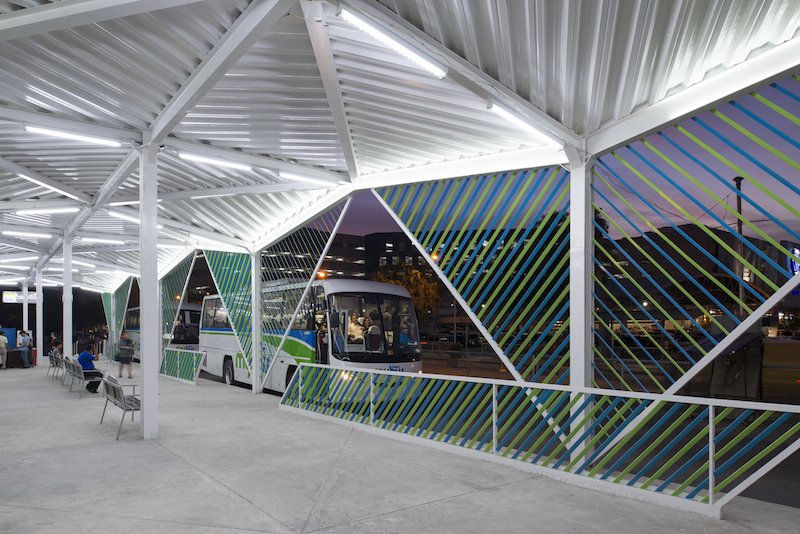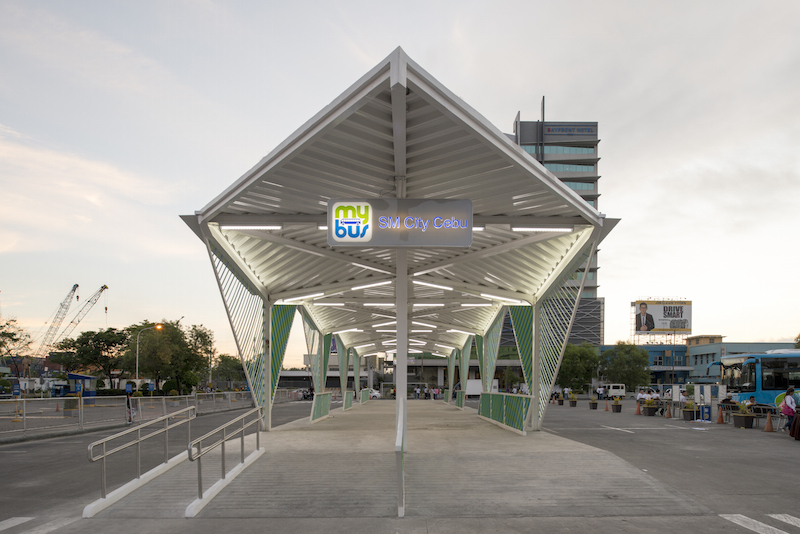By March of next year, Cebu, the oldest and second-largest city in the Philippines, should have its first bus rapid transit system (BTR) completed.
The system stretches from the Cebu International Airport to the city’s business district, and will connect four separately governed cities, BRT is expected to serve between 15% and 25% of the area’s 3.5 million population, and alleviate congestion for nearly one million citizens.
The 19 bus stations along the BRT’s route—five of which have been assembled and are operating—were designed by Brooklyn, N.Y.-based Carlos Arnaiz Architects (CAZA), a six-year-old firm with offices in Bogota, Colombia, and Manila, Philippines. Its Principal and Founder, Carlos Arnaiz, was born in the Philippines, and is a citizen of Colombia.
In an interview with BD+C, Arnaiz said that the decision to move forward on this project reflects how the Philippines is “reaping the benefits of good government” over the last several years, and has emerged as one fastest-growing economies in the region.
The BRT is a public-private partnership that includes the World Bank, the City of Cebu, and the real estate development firm SM Investments. About 3½ years ago, the World Bank commissioned a transportation study that WSP|Parsons Brinckerhoff completed about 18 months ago.
CAZA was brought on to design the bus stations as well as the surrounding street functions, such as lighting and benches, and road improvements. Arnaiz says that he analyzed the station design of systems serving other metros, including Bogota’s TransMilleno.
 The exterior design of the bus stations is a visual reminder of Cebu's reputation for basket weaving and rattan furniture. Image courtesy of CAZA
The exterior design of the bus stations is a visual reminder of Cebu's reputation for basket weaving and rattan furniture. Image courtesy of CAZA
“But our system is quite different, and we pretty much had to start from scratch,” he says.
CAZA designed four different station types, the components for each were made in a factory and are assembled onsite. The stations needed to be able to respond to Cebu’s two climate conditions—extreme heat and extreme rain. So CAZA designed the stations to provide shading and ventilation. It also angled the stations’ roofs and elevated their platforms slightly from street level to prevent flooding. (Stormwater is redirected into nearby retention tanks.)
“The biggest challenge was balancing the pragmatic with the need for cultural expression,” he says. Modular production and assembly were chosen for their affordability (the budget for this project is less than US$3 million) and performance. And the stations are architecturally connected to the city by the design of their louver screens that recalls Cebu’s renown for basket weaving, textiles, and furniture. (Curbed recently posted a story about this project with the headline “Bus Stops or Art Installation?”
Arnaiz hopes this project might lead to other transit-oriented work for his firm, which is currently involved in a hotel project in the Philippines and an office tower in Manila.
 The roof of the bus stops is angled to deflect the heavy rain that Cebu experiences. The stormwater is directed to retention tanks. Image courtesy of CAZA
The roof of the bus stops is angled to deflect the heavy rain that Cebu experiences. The stormwater is directed to retention tanks. Image courtesy of CAZA
Related Stories
Contractors | Jun 4, 2024
Contractors expect to spend more time on prefabrication, according to FMI study
Get ready for a surge in prefabrication activity by contractors. FMI, the consulting and investment banking firm, recently polled contractors about how much time they were spending, in craft labor hours, on prefabrication for construction projects. More than 250 contractors participated in the survey, and the average response to that question was 18%. More revealing, however, was the participants’ anticipation that craft hours dedicated to prefab would essentially double, to 34%, within the next five years.
Building Tech | May 21, 2024
In a world first, load-bearing concrete walls built with a 3D printer
A Germany-based construction engineering company says it has constructed the world’s first load-bearing concrete walls built with a 3D printer. Züblin built a new warehouse from a single 3D print for Strabag Baumaschinentechnik International in Stuttgart, Germany using a Putzmeister 3D printer.
Adaptive Reuse | May 15, 2024
Modular adaptive reuse of parking structure grants future flexibility
The shift away from excessive parking requirements aligns with a broader movement, encouraging development of more sustainable and affordable housing.
Healthcare Facilities | Mar 18, 2024
A modular construction solution to the mental healthcare crisis
Maria Ionescu, Senior Medical Planner, Stantec, shares a tested solution for the overburdened emergency department: Modular hub-and-spoke design.
Modular Building | Feb 6, 2024
Modular fire station allows for possible future reconfigurations
A fire station in Southern California leveraged prefab, modular construction for faster completion and future reconfiguration.
Modular Building | Jan 19, 2024
Virginia is first state to adopt ICC/MBI offsite construction standards
Virginia recently became the first state to adopt International Code Council/Modular Building Institute off-site construction standards.
Modular Building | Jan 19, 2024
Building with shipping containers not as eco-friendly as it seems
With millions of shipping containers lying empty at ports around the world, it may seem like repurposing them to construct buildings would be a clear environmental winner. The reality of building with shipping containers is complicated, though, and in many cases isn’t a net-positive for the environment, critics charge, according to a report by NPR's Chloe Veltman.
MFPRO+ Special Reports | Jan 4, 2024
Top 10 trends in multifamily rental housing
Demographic and economic shifts, along with work and lifestyle changes, have made apartment living preferable for a wider range of buyers and renters. These top 10 trends in multifamily housing come from BD+C's 2023 Multifamily Annual Report.
Data Centers | Nov 22, 2023
How is artificial intelligence impacting data center design?
As AI is reshaping how we interact with machines and the world around us, the design of data centers needs to adapt to this fast-changing landscape. So, Page pairs expert thinking with high-performing solutions to meet the needs of rapidly advancing technologies.
Modular Building | Oct 11, 2023
Development startup brings modular solution to hospitality industry
The company's approach extends to various types of accommodations, from landscape hotels and cozy bed and breakfasts to compact micro hotels and food and wine-themed properties.

















